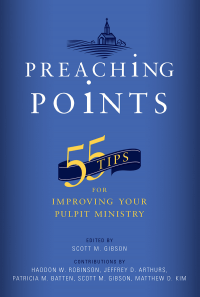You may never have asked yourself this question before, but do your sermons sound angry?
***
There is a temptation in every preacher to begin and end every sermon with correction. Didn’t Paul tell us in 2 Timothy 3:16 that “all Scripture is God-breathed and is useful for teaching, rebuking, correcting, and training in righteousness, so that the servant of God may be thoroughly equipped for every good work”? Yes, he did say that. So we follow suit and begin and end every sermon with correction, rebuke, and training in righteousness because it’s good for our listeners. Their apathy needs to be shaken up a bit with some scolding, we say to ourselves.
While our responsibility as preachers is to teach, rebuke, correct, and train in righteousness, to equip the saints for good works, I’m not convinced that every sermon needs to start out with such stern exhortation. Perhaps we could be more gentle as we begin our sermons and praise our listeners before we correct them.
As I read the book of Revelation, in particular Jesus’ messages for the seven churches in Asia, He isn’t always so quick to rebuke and correct as we are prone to do. In fact, Jesus often begins with praise and then moves to correction.
Here are a few examples. Jesus says to the church in Ephesus: “I know your deeds, your hard work and your perseverance. I know that you cannot tolerate wicked men, that you test those who claim to be apostles but are not, and have found them false. You have persevered and have endured hardships for my name, and have not grown weary. Yet I hold this against you: You have forsaken your first love. Remember the height from which you have fallen! Repent and do the things you did at first.” Praise and then correct.
To the church in Pergamum, Jesus makes this observation: “I know where you live—where Satan has his throne. Yet you remain true to my name. You did not renounce your faith in me, even in the days of Antipas, my faithful witness, who was put to death in your city—where Satan lives. Nevertheless, I have a few things against you.” Praise first and then rebuke.
To the church in Thyatira Jesus says: “I know your deeds, your love and faith, your service and perseverance, and that you are now doing more than you did at first. Nevertheless, I have this against you: You tolerate that woman Jezebel, who calls herself a prophetess.” Praise first and then correct in righteousness.
While Jesus doesn’t always follow this pattern, there is something to be said about offering praise to our listeners before correcting them. It’s an attitudinal shift that we desire.
I remember when the honeymoon phase at my church began to fade. We were now in the thick of ministry. I witnessed a lack of hunger and desire in my church for God and the apathy that exuded week after week. Without even knowing it, my sermons had become weekly bombs where I sent off missiles to the church by scolding and rebuking and correcting them in every sermon often from start to finish. It was only when someone pulled me aside one Sunday and asked me if I was alright [that I realized what I was doing]. “Yes, I’m alright,” I said. “Then why do you sound so angry at us?”
Ah, I learned a great lesson that day.
As a general disposition, people need to know that they are loved before they want instructions on how they ought to change. We can praise our listeners first for the ways they are being faithful to God before we rebuke and correct and train in righteousness.
So give it a try—praise your listeners before correcting them.
***
By the way, did you know Faithlife Sermons offers tone analysis? How do your sermons sound to your congregation?






